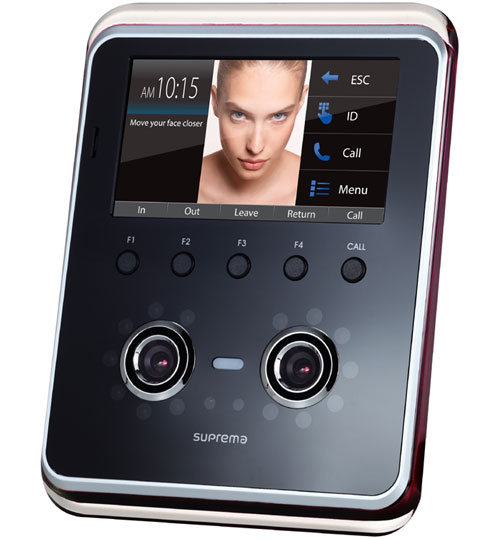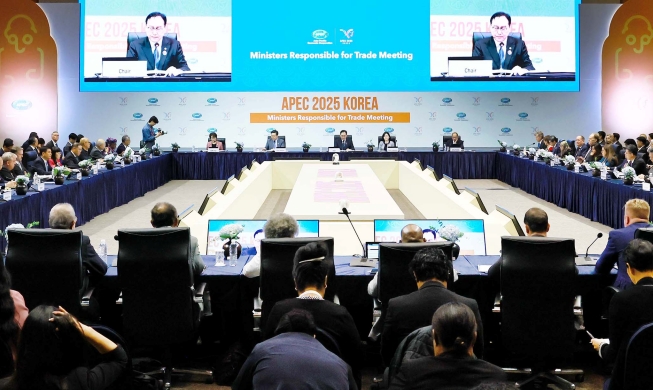When a human face appears on the screen, there is a beeping sound and the door opens.
This is how FaceStation works, a security device based on human facial recognition.
It is not a scene from a sci-fi movie. This technology was made possible thanks to Suprema, a bio-recognition technology firm based in Seongnam, Gyeonggi-do (Gyeonggi Province).

Founded in 2000 as a biometrics firm, Suprema has now shown its world-leading technological prowess, especially in the face and fingerprint recognition sectors. It was not an easy path to success. Rather, it was a rocky beginning, as in the early 2000s, the biometrics recognition technology market in Korea was saturated with about 200 companies. There was fierce competition, and all the firms experienced difficulty entering overseas markets, growing exports and making attractive investments.
Suprema did not give up. Instead, it focused on research and development. In 2004, it began to receive the spotlight when it won the global Fingerprint Verification Competition (FVC) with its SFM3000, a fingerprint recognition machine that has the lowest error rate in the industry. This module was exported to about 100 countries. Suprema topped the FVC in 2006 and 2010 as well, displaying its technological expertise worldwide.
In 2006, Suprema showcased its “BioStation,” a fingerprint recognition machine equipped with a color LCD screen and a USB outlet. It could connect to a network and send its data wirelessly. In 2011, the firm launched FaceStation, a face recognition unit that uses adaptive infrared light technology which can even distinguish between identical twins in the dark. Within one year of its launch, the firm received orders from the justice ministry in Ecuador and from the National Police in Colombia. Last October, FaceStation machines were even featured in season four of “Homeland,” a popular spy/ action TV show from the U.S. Most recently, the company has received orders for 150 FaceStation machines from the Iran-based subway management firm TUSROC.
With biometric technology that can recognize human fingerprints, faces and irises, Suprema recorded an average growth rate in sales of 39.5 percent between 2007 and 2012. Currently, the company exports to 120 countries around the globe, including to the Americas, Europe, Asia, the Middle East and Africa.
By Yoon Sojung
Korea.net Staff Writer
arete@korea.kr
This is how FaceStation works, a security device based on human facial recognition.
It is not a scene from a sci-fi movie. This technology was made possible thanks to Suprema, a bio-recognition technology firm based in Seongnam, Gyeonggi-do (Gyeonggi Province).

FaceStation, Suprema's human face recognition machine, uses adaptive infrared lights, a technology which shows a highly accurate recognition rate.
Founded in 2000 as a biometrics firm, Suprema has now shown its world-leading technological prowess, especially in the face and fingerprint recognition sectors. It was not an easy path to success. Rather, it was a rocky beginning, as in the early 2000s, the biometrics recognition technology market in Korea was saturated with about 200 companies. There was fierce competition, and all the firms experienced difficulty entering overseas markets, growing exports and making attractive investments.
Suprema did not give up. Instead, it focused on research and development. In 2004, it began to receive the spotlight when it won the global Fingerprint Verification Competition (FVC) with its SFM3000, a fingerprint recognition machine that has the lowest error rate in the industry. This module was exported to about 100 countries. Suprema topped the FVC in 2006 and 2010 as well, displaying its technological expertise worldwide.
In 2006, Suprema showcased its “BioStation,” a fingerprint recognition machine equipped with a color LCD screen and a USB outlet. It could connect to a network and send its data wirelessly. In 2011, the firm launched FaceStation, a face recognition unit that uses adaptive infrared light technology which can even distinguish between identical twins in the dark. Within one year of its launch, the firm received orders from the justice ministry in Ecuador and from the National Police in Colombia. Last October, FaceStation machines were even featured in season four of “Homeland,” a popular spy/ action TV show from the U.S. Most recently, the company has received orders for 150 FaceStation machines from the Iran-based subway management firm TUSROC.
With biometric technology that can recognize human fingerprints, faces and irises, Suprema recorded an average growth rate in sales of 39.5 percent between 2007 and 2012. Currently, the company exports to 120 countries around the globe, including to the Americas, Europe, Asia, the Middle East and Africa.
By Yoon Sojung
Korea.net Staff Writer
arete@korea.kr
